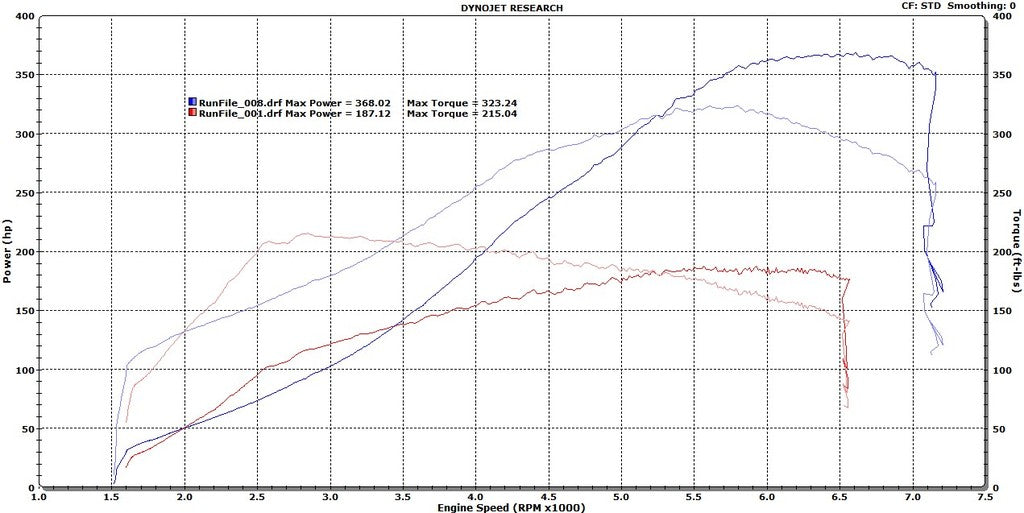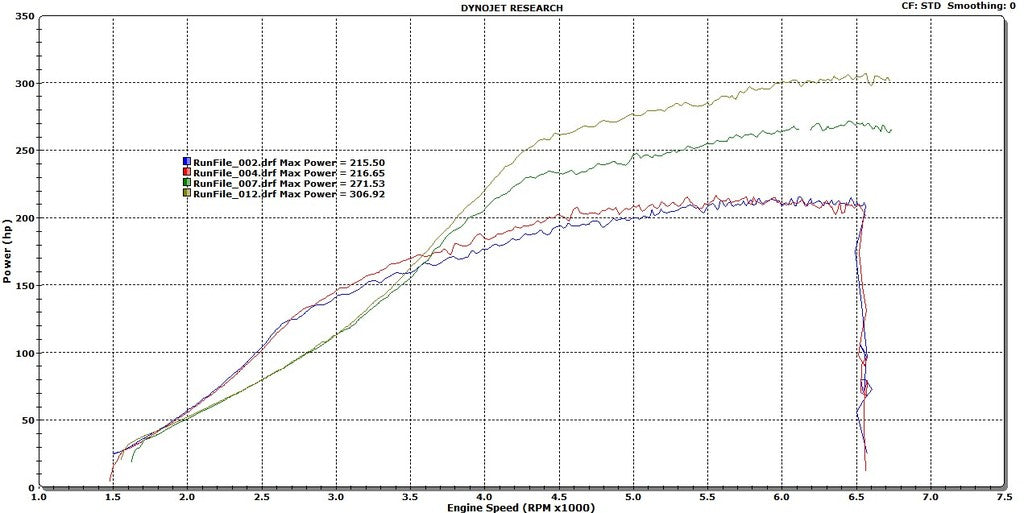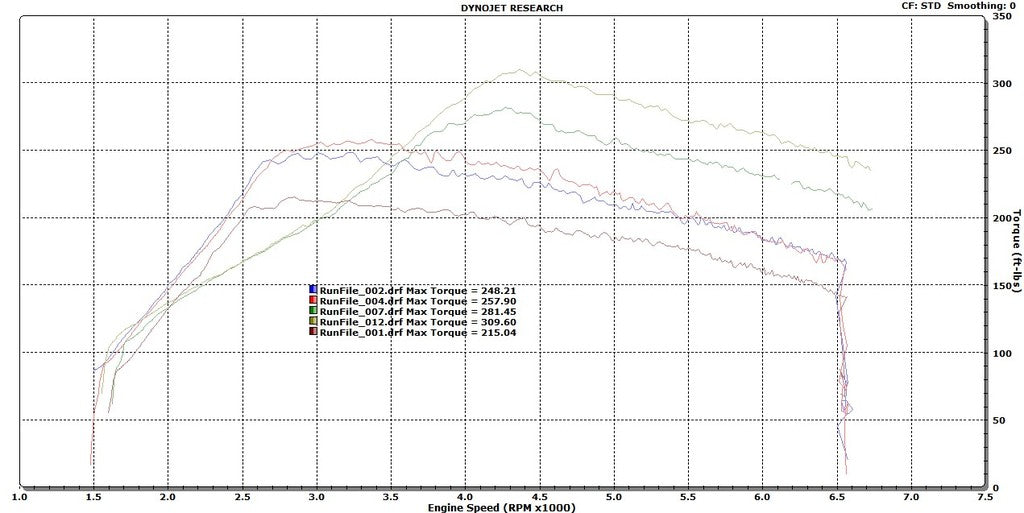The results for our long awaited 2016+ Civic 1.5T Bolt-On Big Turbo Upgrade Kit are in! We have spent the past few weeks doing R&D with James from KTuner to figure out the necessary ECU tuning for a big turbo setup. Along the way we overcame quite a few hurdles, which required new background coding and experimenting with different tables/parameters.
Our test subject’s (2017 Civic SI) setup is as follows:
· 100% stock engine and transmission
· 100% stock fuel system
· PRL Motorsports Big Turbo Upgrade Kit w/ Cast wheel GT2860RS Disco Potato (.64 A/R and .86 A/R housings tested)
· PRL Motorsports FMIC Kit w/ Charge Piping
· PRL Motorsports Cobra Cold Air Intake (Street and Race MAF housings tested)
· PRL Motorsports Front Pipe
· Stock catback exhaust
· Clutch Masters FX400 6-Puck Rigid Clutch
· Stock flywheel
· PRL Motorsports Braided Clutch Line
One of our first obstacles for this big turbo upgrade was boost control. These cars are equipped with an electronic wastegate actuator for boost control from the factory. We kept this in mind when designing our kit for future possibility of integrating an electronic wastegate actuator. However, for the time being we decided to ditch this and utilize a manual boost controller to command desired boost pressures. KTuner worked to enable coding to make this possible.
Once we figured out boost control we began tuning with our Street MAF housing , “small” .64 A/R turbine housing and 93 Octane pump gas to establish a rather simple/effective curve. However, after we began to make more power (low to mid 300 horsepower), we ran into another obstacle; fueling. James came to the rescue once again by working on background coding to allow us to overcome these “limitations.” We were able to put down 325 horsepower and 326 ft/lbs tq with this setup.
Next, we decided to test out the “big” .86 A/R turbine housing to see what type of gains/losses can be seen with this switch. The “big” .86 A/R turbine housing was worth 29 horsepower at peak and 30+ horsepower at higher RPMs in comparison to the smaller .64 A/R turbine housing, bringing us to 354 horsepower and 359 ft/lbs tq. However, due to the nature of a larger housing, there was notable turbo lag of about 1000 RPMs. We were able to run more timing due to the increased efficiency of the larger turbine housing. Please keep in mind that this GT2860RS is the cheapest turbocharger option that we will be offering. The GTX2860R’s billet wheel will help with spool and top-end power, but we wanted to show what an economical turbocharger could do.
.64 A/R housing compared to a .86 A/R housing with Street MAF housing
To finish our testing we added our Race MAF to find an 8 horsepower gain throughout the midrange. Next we added some ethanol to gain even more through the entire powerband, netting us a whopping 368 horsepower and 323.24 ft/lbs tq! This just goes to show that the turbocharger is out of efficiency, which is no surprise from a turbo only rated to 360 horsepower.
Due to the increased efficiency of this larger turbocharger, intercooler charge temps stayed cool the entire time with our intercooler!
Now let’s put this all into perspective:
Here is a graph showing the power output of a basic bolt-on car. This car was equipped with our catless downpipe/front pipe combo, Cobra CAI (Street MAF housing) and KTuner OTS preset 19.5/23 PSI maps.
· Run 2 is 19.5 PSI and Run 4 is 23 PSI, which falls to 18-19 PSI at higher RPMs due to the nature of the small turbocharger.
Here is a graph showing what our basic turbo kit (GT2860RS, small .64 A/R turbine housing and Street MAF housing) is capable of at the same/similar boost levels.
· Run 7 is 18.5 PSI (as close as we could get to 19 PSI) and Run 12 is 23 PSI, which holds flat to redline
We experienced 70+ horsepower and 74 ft/lbs tq gains at the same boost levels, which also carry to redline.
Just to reiterate one more time, here is a stock car compared to a the bolt-on car and our turbo kit at ~19.5 PSI and 23 PSI.
Here is a stock Civic compared to our turbo kit at 26 PSI with both the “small” .64 A/R and “large” .86 A/R turbine housing.
We experienced 125+ horsepower and 110 ft/lb tq gains at 23 PSI in comparison to a 100% stock Civic!
We also experienced 95+ horsepower and 110 ft/lb tq gains at 23 PSI in comparison to a basic bolt-on Civic!
We finally got the chance to test out the GTX2867R GEN2 with "small" .64 A/R turbine housing and made numerous 390-398 whp and 370+ ft/lb tq hits! This little 1.5L engine is proving to be very stout thus far! We have a few more tricks up our sleeves to see if we can break the 400 whp barrier with this setup on Monday!
New power record anyone?!
Here are some comparisons of the GT2860RS vs the GTX2867R GEN2. In our opinion, the GTX2860R GEN2 (that we didn't get to test) with the .64 A/R housing will be the best bang-for-the-buck setup for stock engine setups!
These are astonishing gains from such a simple and cost-effective turbo setup. With that being said, customers will have the option to choose from quite a few different turbocharger and turbine housing options to suite their driving style and power goals. Options will vary from this cast wheel GT2860RS, to its billet-wheel-brother GTX2860R, all the way to the 650+ horsepower rated GEN2 GTX3071R.
Our standard turbo kit will include:
· Choice of turbocharger w/ turbine housing(s)
· Wastegate actuator w/ associated hardware
· Turbocharger adapter flange
· Downpipe
· Heatshield
· Custom molded silicone pieces
· TurboSmart 34mm Kompact Plumb Back Recirculating Bypass Valve
· Hot side silicone pipe w/ silicone
· Stainless clamps
· Intake overpipe w/ PCV flange
· Cobra cold air intake adapter silicone (Race or Street)
· All gaskets and hardware needed for install
· Optional FMIC Upgrade Kit
· Optional Cobra Cold Air Intake System
· Optional boost controller



















Comments (3)
I have this kit except with ewg. My question is how many if any spacers should I be using.
I just wanna know if you guys still make this kit
Would you have a big turbo in stock for 2020 si